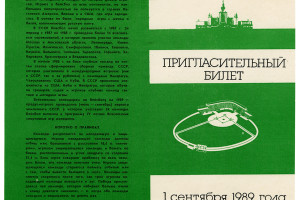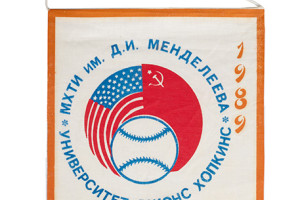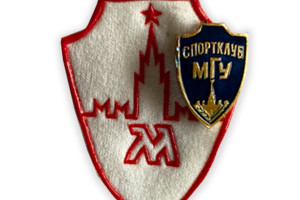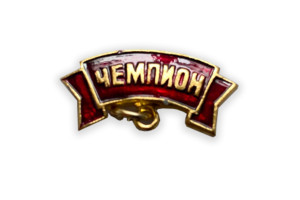
On September 2, 1989, Peter O’Malley meets with Ramaz Goglidze, of Georgia, during the opening of Matsumae Baseball Stadium, Moscow State University, Russia. Goglidze, was President, USSR Baseball Federation (1987-1991) and Chairman, Foreign Affairs Commission, Georgia. Goglidze was also Honorary President of the Georgian Baseball and Softball National Federation.
Russia: Baseball as a Force for World Peace
By Brent Shyer
Long before the World Baseball Classic was inaugurated as a showcase for the international growth of baseball, a group of individuals had to take significant steps to help develop the game. Dr. Robert Smith, President of the International Baseball Association, had the idea to put together a “kitchen cabinet” of individuals who were like-minded in their desire to assist in the expansion of international baseball. Dr. Smith appointed Baseball Commissioner Bowie Kuhn, Rod Dedeaux, legendary head baseball coach of the University of Southern California, and Dodger President Peter O’Malley.
That quartet led the way to earning baseball a permanent place in the Olympic Games program as a gold medal sport.

In September, 1989, a cartoon character playing baseball is on a promotional item of Russia’s first baseball field. Dr. Shigeyoshi Matsumae, founder and President of Tokai University, Tokyo, privately built the 1,500-seat baseball stadium in Moscow, Russia.
But some countries that were important to achieving that goal were not playing much baseball, including the People’s Republic of China and Russia. However, funding would be available from the International Olympic Committee (IOC) to help with the development of the game if baseball was an “official” sport. At the grass roots level, that can be a game-changer for future participants in the Olympics.
In 1982, Dr. Shigeyoshi Matsumae, founder and President of Tokai University, Tokyo had the idea that Peter O’Malley should meet in person with the Soviet Union Minister of Sports Sergei Pavlov in order to seek support for baseball to become an official Olympic sport. Dr. Matsumae believed that sports and in particular baseball could be a significant bridge connecting Japan, Russia and the United States. Dr. Matsumae wrote a letter of introduction for O’Malley and Akihiro “Ike” Ikuhara, assistant to O’Malley, to hand carry to Russia.
O’Malley, who had to cancel joining Ikuhara at the last minute, provided the letter of introduction to Ikuhara to hand carry to Pavlov, from Pavlov’s good friend Dr. Matsumae. Ikuhara traveled to Moscow to meet with Pavlov. October 7, 1982 marking the first time baseball in the Western Hemisphere made official contact with the Soviet Union. The meeting, held in Moscow, was also attended by Isao “Dutch” Odachi, baseball coach in Japan and baseball advisor to Dr. Matsumae.
“The message was that we would appreciate it if Russia would not veto baseball and Dr. Matsumae was planning to build a baseball stadium at Moscow State University on Lenin Hill in Moscow,” said O’Malley. “As we were considering our goal, we realized that if baseball became an official Olympic sport significant dollars would be sent to developing countries by the IOC to fund instructors, fields and equipment and that would greatly enhance the growth of baseball.”
Dr. Matsumae’s letter was a success. Ikuhara and Odachi immediately traveled from Moscow to IOC headquarters in Lausanne, Switzerland to meet Dr. Arpad Csanadi (from Hungary), chairman of the IOC Programing Committee, to convey the message about their meeting with Pavlov, who was also president of the USSR National Olympic Committee, and that he would not oppose the movement for baseball to become an official gold medal sport.
Shortly thereafter, on October 12-13, 1982, O’Malley flew to Tokyo to meet with Dr. Matsumae to express his appreciation for the letter that opened the door to Pavlov and his cooperation.

June 14, 1983, Chairman’s Box, Dodger Stadium, Los Angeles (L-R) Dodger President Peter O’Malley hosts actor Cary Grant; Dr. Shigeyoshi Matsumae, founder and President, Tokai University, Tokyo; and entertainer Danny Kaye.
O’Malley continued to discuss international baseball while Dr. Matsumae attended games at Dodger Stadium in 1983 and for the summer 1984 Olympic Baseball eight-team exhibition tournament. During this time, Dr. Matsumae and O’Malley also met with other international baseball leaders and again talked about Matsumae’s interest in building the first field dedicated to baseball in Russia. On November 6, 1985, O’Malley wrote in a letter to Dr. Matsumae, “It seems to me that now is the perfect time to build a baseball field in Russia and I am anxious to discuss this long time dream of yours with you.”

(L-R): Eiichiro Yamamoto, Executive Vice President, Baseball Federation of Asia; Li Menghua, Minister of Sports, People’s Republic of China; Dr. Shigeyoshi Matsumae, founder and President, Tokai University, Tokyo; Li Ruihuan, Mayor of Tianjin; and Peter O’Malley. Grand Opening ceremonies for “Dodger Baseball Field”, privately built by Dodger President Peter O’Malley, September 12, 1986, Tianjin Institute of Physical Culture, TIanjin, People’s Republic of China. Dr. Matsumae opened his baseball stadium in Russia three years later.
The following year, inspired by Dr. Matsumae’s idea, O’Malley himself privately built the first baseball field in the People’s Republic of China, another country where the development of baseball could accelerate. Dr. Matsumae joined O’Malley for the dedication ceremonies on September 12, 1986 in Tianjin, China. O’Malley said at the time, “Baseball for the world, baseball for peace.” Dr. Smith said, “By building the field in China, the Dodgers complemented Dr. Shigeyoshi Matsumae’s plan to build a stadium in the Soviet Union. The Dodger seed was planted in China, and that started the ripple effect for O’Malley’s longtime friend, Dr. Matsumae, to help in Russia.” Sid Robinson, The Los Angeles Dodgers 1992 Commemorative Yearbook, Page 89
On October 13, 1986, the aforementioned quartet along with additional international baseball leaders were rewarded for their efforts, receiving the good news that the IOC approved baseball as a gold medal sport for the 1992 Olympic Games in Barcelona. Following that, the Russians started to form a national team and baseball leagues.
In 1988, O’Malley invited two baseball coaches from Russia – Alexander Ardatov and Guela Chikhradze – to visit and stay at Dodgertown, Vero Beach, Florida during Spring Training to observe and learn from fellow coaches, players and personnel. When asked at a press conference why the coaches had come to Dodgertown, Chikhradze told the media, “We heard this baseball camp was the best place to start!” Ramaz Goglidze, of Georgia and president of the USSR Baseball Federation, also was O’Malley’s guest at Dodgertown that spring. Goglidze was introduced to the Holman Stadium crowd prior to the March 8 Dodgers vs. Baltimore Orioles game and threw the ceremonial first pitch.
Weeks later, O’Malley and Ikuhara spent several days (April 17-21) in Moscow meeting with baseball leaders and attending the groundbreaking ceremonies for Matsumae Baseball Stadium at Moscow State University, a $3.2 million project donated by Dr. Matsumae, who believed in diplomacy and world peace through sport. IBA President Dr. Smith was in Moscow for the historic groundbreaking. Coach Dedeaux, also traveling to the ceremonies, spoke of O’Malley’s involvement in Russia, “The baseballs were so bad that I know O’Malley has already sent them at least one shipment of National League baseballs.” Phil Elderkin, The Christian Science Monitor, “Soviets are baseball babes eagerly in search of Ruthian skills”, September 6, 1988 O’Malley would send more equipment to assist Russia’s early baseball movement.

Dodger President Peter O’Malley (right) is in Moscow, Russia to attend groundbreaking ceremonies for the first field dedicated solely to baseball in Russia, privately constructed by his friend Dr. Shigeyoshi Matsumae, founder and President of Tokai University, Tokyo. O’Malley is joined by his longtime assistant Akihiro “Ike” Ikuhara on the trip starting April 17, 1988 and they stand next to the artist’s rendering of Matsumae Baseball Stadium.

(L-R): Alexander Ardatov, Head Baseball Coach, USSR National Baseball Team; Dr. Bob Smith, President, International Baseball Association; Rod Dedeaux, legendary USC head baseball coach; Dodger President Peter O’Malley; and Ramaz Goglidze, President, USSR Baseball Federation. On April 20, 1988, O’Malley was in Moscow, Russia to attend groundbreaking ceremonies for Matsumae Baseball Stadium at Moscow State University.

(L-R): Front row — Marat Gramov, President, USSR Olympic Committee; Dr. Shigeyoshi Matsumae, founder and President, Tokai University, Tokyo; Dodger President Peter O’Malley. Back row: Isao “Dutch” Odachi, baseball coach and baseball advisor for Dr. Matsumae; Tomoo Hirooka, President, Japanese Student Baseball Federation; Tatsuro Matsumae, House of Counselors; Dr. Bob Smith, President, International Baseball Association; Viacheslav Gavrilin, Vice Chairman, USSR Sports Committee; Ramaz Goglidze, President, USSR Baseball Federation; Rod Dedeaux, legendary USC head baseball coach; and unknown. On April 20, 1988, O’Malley attended groundbreaking ceremonies for Matsumae Baseball Stadium at Moscow State University, Moscow, Russia.
Steve Wulf wrote in the July 25, 1988 Sports Illustrated about the development of baseball in Russia: “Goglidze is an engaging and articulate spokesman for baseball and he speaks fondly of his trip last spring to Dodgertown at the invitation of Dodger owner Peter O’Malley.” Steve Wulf, Sports Illustrated, July 25, 1988 In 1988, O’Malley also had a dinner meeting with Richard Spooner. A sports column explains, “There is an American in the Soviet Union named Richard Spooner, a former intramural baseball player at Yale University, who regularly shows videotapes and films of American and National League games to Russian players in his living room. Spooner, who works for a trade consortium in Moscow, gets some of his tapes from the Dodgers.” Phil Elderkin, The Christian Science Monitor, “Soviets are baseball babes eagerly in search of Ruthian skills”, September 6, 1988

June 27, 1988, Tokyo, Japan, (L-R) unknown; Dodger President Peter O’Malley; Dr. Shigeyoshi Matsumae, founder and President, Tokai University, Tokyo; Dr. Creighton Hale, President, Little League Baseball; and Akihiro “Ike” Ikuhara, Assistant to Dodger President. A group meeting in the office of Dr. Matsumae to discuss his on-going building of the first baseball field in Russia and to encourage countries to seek world peace through baseball.
U.S. News & World Report explained O’Malley’s interest in helping to develop Russia this way: “O’Malley and other international baseball promoters see a larger role for their game, a sort of glasnost of the diamond. Some even dream of a truly global World Series. The Yomiuri Giants vs. the Leningrad Dodgers? Why not?” U.S. News & World Report, October 17, 1988
On September 1, 1989, O’Malley stood with Dr. Matsumae and Anatoly Logunov, President of Moscow State University, for ribbon-cutting on the field during the Grand Opening Ceremonies for Matsumae Baseball Stadium which opened with a two-day, four-team tournament (including China’s Tianjin Institute; University of Miami; Japan’s Tokai University; and host Moscow State) on an artificial turf surface. Longtime Los Angeles sports columnist Bob Hunter wrote, “If there’s any nation that has not been touched by Peter O’Malley, it probably is not on the map.” Bob Hunter, Los Angeles Daily News, March 24, 1981

Dodger President Peter O’Malley meets with Viktor Khotochkin, Vice President of the USSR Baseball Softball Federation, at Dodger Stadium during the U.S. Olympic Festival Opening Ceremonies on July 12, 1991.
O’Malley explained, “You can put baseball people together from Russia, the United States, Australia, anywhere, and there’s a common denominator and camaraderie.” Vero Beach Press Journal, February 26, 1994

Clipping from the Vero Beach Press Journal in Vero Beach, Florida. The Moscow Red Devils from Russia were set to play the professional Samsung Lions of the Korea Baseball Organization at Dodgertown on January 30, 1993.
On January 30, 1993, the Dodgers invited the Moscow Red Devils to work out and play the professional Samsung Lions of the Korean Baseball Organization at Holman Stadium, Dodgertown, Vero Beach, Florida. It was the first-ever meeting between a Russian team and a South Korean professional team. The Lions, who were training and staying at Dodgertown, defeated the Moscow Red Devils, 7-0.
The first of seven Dodger Russian-language radio broadcasts during the 1998 season from Dodger Stadium was held April 9 on KMNB-AM. At the time, the Southland boasted of a Russian-speaking population of nearly 400,000.
On June 25, 2000, a certificate of appreciation named for M.V. Lomonosov, founder of Moscow State University, was presented to O’Malley. It reads, “We hereby express our deep appreciation of the contributions that Mr. O’Malley has made to the sport of baseball around the world. His understanding and love for amateur baseball has been an inspiration and a driving force to those working to develop and expand the field of amateur baseball worldwide. We would also like to express our appreciation of the assistance and support he extended to players of Russia to improve their baseball skills, both technical and mental. We look forward to our continued relationship and working with him in the coming years to promote and fulfill our mission of developing international peace and friendship through baseball.”

Certificate of Appreciation presented to Peter O’Malley for his contributions to baseball around the world from Victor A. Saadovnichii, President of Moscow State University in 2000. The certificate is named for M.V. Lomonosov, the famous 18th century Russian scientist and writer.
Kim Palchikoff of The New York Times wrote of the growth of baseball in Russia on July 24, 2001: “The Russians were able to learn the game thanks to donated equipment and expertise from baseball lovers overseas – namely Cuba, Japan, and the former Los Angeles Dodgers President Peter O’Malley.” Kim Palchikoff, The New York Times, July 24, 2001
In 2007, O’Malley and his wife Annette returned to Russia to attend the 10th Anniversary of the Matsumae Memorial International College Baseball Tournament on the campus of Moscow State University.

The June 22-29, 2007 program cover from the 10th Matsumae Memorial International College Baseball Tournament in Moscow. Peter O’Malley and his wife Annette attended the tournament.

June 24, 2007, Matsumae Memorial Baseball Stadium, Moscow State University, Russia. Front center: Tatsuro Matsumae, President, Tokai University, Tokyo and Peter O’Malley with the Kyung Hee University baseball team from Seoul, South Korea. Tatsuro’s father Dr. Shigeyoshi Matsumae, founder of Tokai University, privately built the first baseball field in Russia in 1989 and this was the 10th Matsumae Memorial International College Baseball Tournament.
Years later, O’Malley enjoyed meeting and reminiscing with Kiyoshi Yamada, Chancellor of Tokai University and his colleagues from Tokai for lunch at Mr. C restaurant in Beverly Hills, California. Yamada is the son-in-law of Dr. Tatsuro Matsumae and the friendship between the Matsumae and O’Malley families continues to this day.























